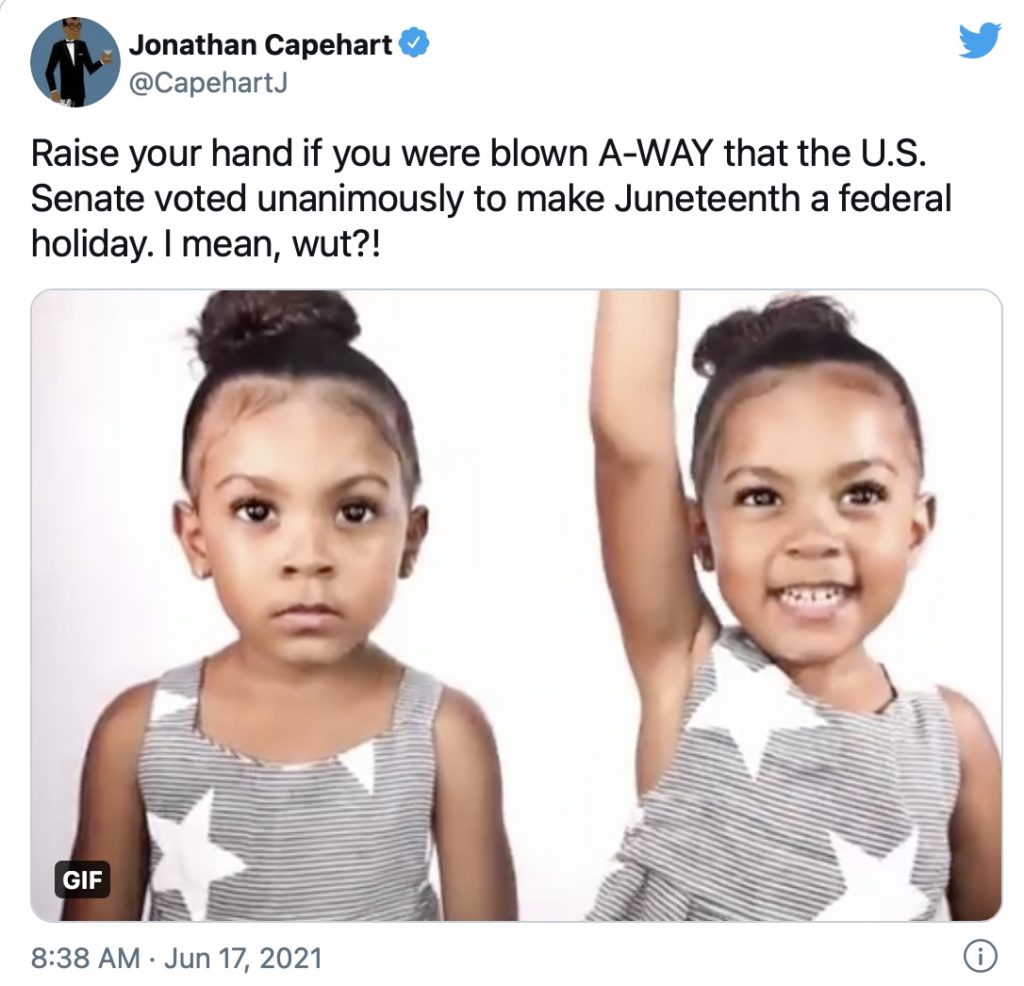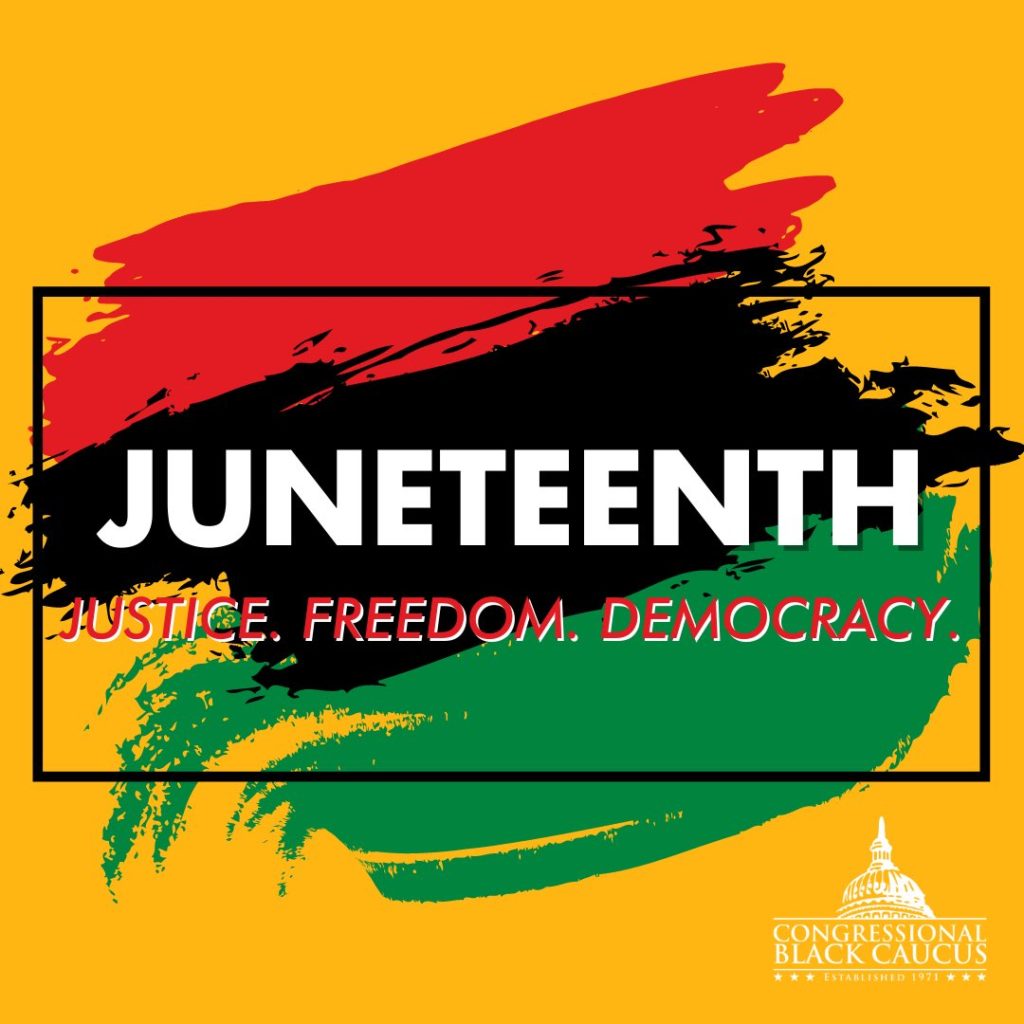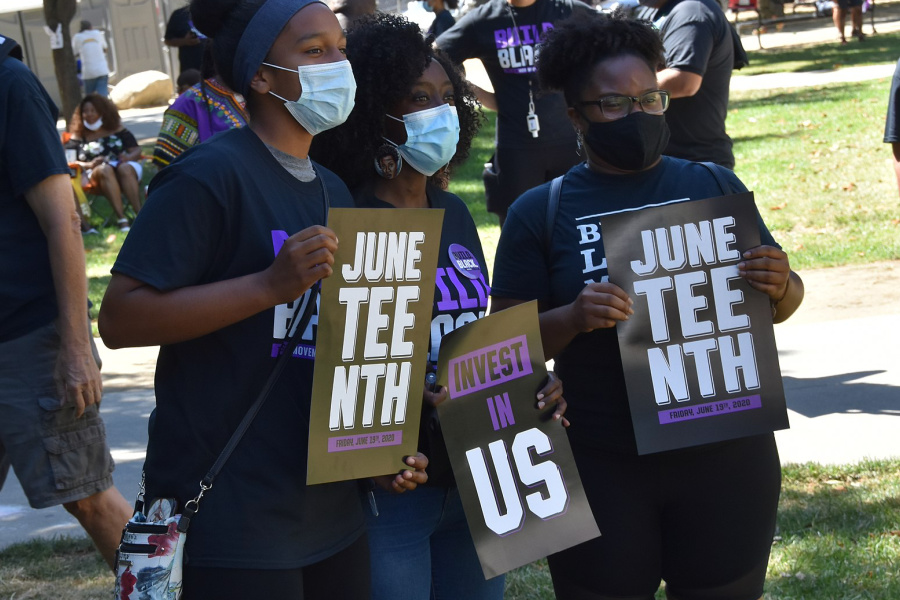Today marks the very first Juneteenth since the US Senate unanimously passed a resolution to make Juneteenth a national holiday this week and it was quickly signed into law by President Biden on Thursday. It’s amazing! So many of us grew up never having heard of Juneteenth — let alone knowing the story of enslaved people who remained enslaved in Texas by being kept willfully unaware of the Emancipation Proclamation, which had been signed two entire years before.
This brings us one step closer to a generation of kids who will grow up learning that Black history is American history, and having the knowledge and ability to advocate for a more equitable and just world for all.
In the words of Emma Lazarus,” until we are all free, none of us are free.”

Via Jonathan Capehart @CapeheartJ
However, this can’t be a token gesture.
There are quite a few things that our elected officials must do to honor and support the Black American community, in order to make good on the promise of emancipation in the first place.
It’s a more than a little hypocritical to vote to honor the (real) end of slavery, while still supporting laws, policies, and systems that deny those same Americans’ grandchildren and great grandchildren equal and equitable access to the American Dream.
In fact, plenty of Black American pundits, authors, and thought leaders I respect have made excellent points all week long that this has to be something beyond “a day off” for federal employees and school kids — let alone a commercialization opportunity for mattress stores and car lots. (Eek.)
Related: 3 excellent educational videos about Juneteenth for kids. Watch and learn together.
America making Juneteenth a national holiday while banning people from teaching about it in schools is ironic
— Robert Simmons III (@Robert_Simmons3) June 16, 2021
Juneteenth should be a national holiday, but these gestures seem almost insulting when there’s a widespread attack on black voting rights and nothing has been done to rectify state-sanctioned violence against black folks. Also:
— Jemele Hill (@jemelehill) June 16, 2021
As an avowed white lady, I am not an expert on this, so I’ll do my best to quote and link to those who are. What I do know however is that it’s important for me, and white people like me, to speak up about it; as someone who benefits from an inequitable system, it’s on me to do what I can to help dismantle it.
So if you support Juneteenth, and I hope that you do, please consider taking just a minute or two of your day to reach out to your elected officials and advocate for a few meaningful changes.
Here are some of the biggest ones on the table:
1. Eliminate voter disenfranchisement laws
This comes first, above all else. I mean come on, this is the core of our democracy! And yet, there are currently dozens of laws across the US — 20 new ones from this year alone — designed to disenfranchise voters, and particularly voter of color. It’s been called Jim Crow 2.0 and no lies there.
In fact the king of gerrymandering himself called that tactic “the only legalized form of vote stealing left.” So yeah, the goal is to steal our votes if not preventing them all together.
Here’s a thought: If one political party is losing more and more voters, maybe they need to start rethinking their platform — not rethinking ways to get those voters out of the equation. It’s disgraceful, and that’s about the nicest word I can use here.
What you can do: Tell your Senator to vote for For the People Act, The bill includes measures to modernize voter registration, restore voting rights, protect ballots, end gerrymandering, provide for election security, counter foreign interference, overhaul campaign finance laws, and more — at the federal level, in part to help keep states a minimum baseline for voter’s rights.
You can also look at your own state’s voter disenfranchise bills, laws, and other regulation and reach out at the local and state levels. America should be about giving every single adult citizen a voice at the ballot box, not just the ones who agree with a gerrymandered state legislature.
Tip: Here’s what to say when you call a Member of Congress or any elected, and what will happen. It’s easier than you think!
2. Insist that an accurate history of racism to be taught in schools at all levels.
This includes The 1619 Project (a K-12 curriculum), Anti-Racism studies, and Critical Race Theory. And to be clear, these are three distinct and different concepts but they’re all being conflated — and they’re all under attack.
If you want to know more, EdWeek has an excellent primer on CRT as does The Washington Post; overall, it’s an it’s education theory that’s been taught in post-grad curricula and law school (yes, it’s a high-level legal theory) since the 1970s. Really, it’s just a fact-based history.
Imagine being against facts? Well, plenty of people still are — as of this week, 21 state legislatures have introduced bills that restrict how schools can teach racism (and sexism), and 5 states have signed it into law. Some of these bills (mis-) use the phrase Critical Race Theory as a catch-all for “teaching about racism.”
Shorter Republicans: here, take this Juneteenth holiday but we’re gonna make it illegal to ask what Juneteenth is because it would involve insulting slave owners. Also y’all can’t vote anymore. Happy Juneteenth!
— Joy-Ann (Pro-Democracy) Reid ? (@JoyAnnReid) June 17, 2021
Some bad actors — including those on major state school boards — are using this opportunity to also try to ban schools from teaching such horrible, very bad, no-good ideas as anti-racism, white privilege, oppression, multiculturalism, social-emotional learning (yes, really), and that really really scary idea: social justice.
What’s more, from the You Can’t Make This Up Files, detractors are trying to use Martin Luther King Jr.’s words to support…banning the teaching of racism. Terrific op-ed from historian Kevin Kruse.
To be clear, this is some fabricated, nasty, divisive, culture war BS right here and it has truly negative consequences, including harms to academic freedom overall.
As so many people have pointed out, how can you support Juneteenth but not advocate teaching about it?
What you can do: If you have state legislators, Senators, Members of Congress spouting any of this nonsense please call them on this. Tell them why its important for you that our children of all ages learn real, fact-based history in school, even when it’s ugly.
Just because every lesson doesn’t center white people doesn’t make it “reverse racism” (which is not a thing). Just because we learn some of the harder truths about our history doesn’t mean “we are teaching kids to hate their country,” as one prominent fact-averse governor falsely proclaimed. Loving America means wanting us to be the best we can be.
For extra credit: If you have a rep who’s ranting about “Critical Race Theory in kindergarten” on social media, feel free to let them know that kindergarteners are not studying niche law school theories. Maybe they’ll learn something.
3. Pass a federal anti-lynching law
This should be a no-brainer, but there has never been an anti-lynching law in the US. Which is insane. The Emmett Till Anti-Lynching Bill finally passed the house 401-4 in 2019, and had the support of 99 US Senators — is a near miracle these days — only…surprise, guess who held it up from passing by Unanimous Consent. So it stalled.
The New York Times quoted Senator Corey Booker, the original law’s cosponsor, as saying, Tell me another time when 500-plus Congress people — Democrats, Republicans, House members and senators — come together in a chorus of conviction and say, ‘Now is the time in America that we condemn the dark history of our past and actually pass anti-lynching legislation.
This year, the bill been reintroduced by IL Rep Bobby Rush in Congress as H.R. 55 (you should see the huge list of co-sponsors), and needs to pass.
What you can do: Read this change.org petition for a helpful overview and to get some of the language down, but I think it’s always more effective to contact your elected officials directly about passing H.R. 55 than to sign a petition.
Related: If you’ve ever said “this is not America” in response to racism, you need to read Caste.
4. Reimagine policing and eliminate unnecessary violence
If you are a Black parent, you know all about The Talk. If you are a non-Black parent, I hope you know about The Talk, though you might not;
There’s no better example of the difference in how our children are raised to see police officers — either as protectors who can help you in a crisis, or someone who can kill you.
This is why police reform is an incredibly divisive and complex issue; I’m not going to go deep into the many nuanced aspects of the need for police reform and the end to unnecessary police violence, except to say that it’s way overdue. Are there good cops and bad cops? Of course! But let’s be honest, when the origins of police forces in America are rooted in slave patrols (as verified by the National Law Enforcement Museum ), they operate with a lack of national standards, and demonstrate a proven history of racism throughout the system, it’s a whole system that needs fixing.
When we do find ways to reimagine and improve policing, we’ll have more good cops coming up through the force, more incentive to purge the bad ones, and ideally the restoration of integrity and trust to the institution as a whole. That’s good for everyone.
What you can do: First of all, if you haven’t yet, try to figure out where you stand, because there are many positions. Start with the list at the Marshall Project to get a fair and unbiased understanding of the wide continuum of proposals on the table and help you form a position if you don’t already have one, then advocate for changes and new regulations from a local level (city council, community boards, mayoral office) to state and national levels.
It’s also worth reading this ACLU article about criminal law reform that narrows down their most urgent calls to these three (I’m editorializing a bit here for context)::
- Redirect police responsibilities (like mental health calls, traffic accidents, addiction services) so they don’t include enforcement of non-serious offenses. Should cops really be enforcing vaping bans with violent force??
- Invest in alternative policing efforts (e.g. social services, anti-poverty measures) designed to keep local communities safe. The money will be redirected from excessive federal grants and unnecessary military-grade weaponry like grenades, bayonets and missile launchers.
- Implement common sense legal constraints against police violence
Other proposals range from diversifying police forces to deweaponizing police or eliminating it entirely. Like I said, it’s a broad continuum. So whatever changes you believe are the right ones, it’s clear from countless published studies that Black Americans are disproportionately hurt by the current policing system in America, and from an ethical, moral, and legal standpoint, this needs to be addressed with urgency.
Not one more Black person should ever be executed for a routine traffic stop. Not in our United States of America, home of the Juneteenth “National Independence Day” Holiday.
5. Create a system for reparations
If you’ve read about the Tulsa Race Massacre and its generational impact, if you’ve read the book Caste by Isabel Wilkerson (which I cannot recommend enough) or any number of thoughtful, scholarly articles like Ta-Nehisi Coates’s essential Atlantic piece, The Case for Reparations, it’s nearly impossible not to see the importance of reparations to the descendants of enslaved people in America.
(Seriously, settle in and read it. Wow did I learn a lot.)
This is not a symbolic gesture. When your family’s land has been stolen, your business burnt or destroyed, your savings depleted, your educational opportunities diminished, your home-buying abilities eliminated through red-lining or mortgage denials — think of the cumulative impact that would have on your children, their children, and generations beyond that. In America, wealth begets wealth.
For a shorter but impactful summary, read Rep Sheila Jackson Lee’s article explaining H.R. 40, The Commission to Study and Develop Reparation Proposals for African Americans Act, which she is now sponsoring 40 years after it was originally introduced.
One paragraph:
Though critics have argued that the idea of reparations is unworkable politically or financially, their focus on money misses the point of the H.R. 40 commission’s mandate. The goal of these historical investigations is to bring American society to a new reckoning with how our past affects the current conditions of African Americans and to make America a better place by helping the truly disadvantaged. Consequently, the reparations movement does not focus on payments to individuals, but to remedies that can be created in as many forms necessary to equitably address the many kinds of injuries sustained from chattel slavery and its continuing vestiges. To merely focus on finance is an empty gesture and betrays a lack of understanding of the depth of the unaddressed moral issues that continue to haunt this nation.
What you can do: Tell your Member of Congress to support H.R. 40 and urge your Senators to bring it to a vote. The ACLU has a ready-made letter to Congress with some good language you can use.
The premise of reparations is complex and complicated, and economic justice on a federal level will start with a fair and bold study of the legacy of slavery — but you can also advocate at the local level. Recently, state legislatures have approved reparations programs or bills in states like California and New York, as well as cities from Providence to Ashville, Burlington to Evanston, Illinois.
If your city is among them, thank your elected officials for supporting it; if you have a bill on the table — or need one — urge your electeds to get on board.
——-
You may have other causes you feel I’ve left out, but I’ve tried to focus on the ones I see as the most urgent, with the most support.
(If you need more ideas, read up on Tammy Duckworth’s Environmental Justice for All Act, which connects clean water, air and other environmental failings with racially disproportionate public health issues; as well as the Paycheck Fairness Act, which seeks to address the equal pay gender gap in new ways — and to rectify the disproportionate impact on BIPOC women.)

Via @RepValDemmings
I do think the creation of Juneteenth as a National Holiday is a good thing. The vast majority of 500+ Members of Congress believe it’s a good thing (with a few notable, disgraceful exceptions.)
Holidays, especially those that may not involve our children or their family cultures or histories personally, generally compel teachers, parents and caregivers to find ways to talk about its meaning and importance, whether it’s Hanukkah, Eid, Veteran’s Day, or Martin Luther King Jr Day. I know that holiday like these have helped me do more research and try to learn more, so my kids can learn more too.
But learning more isn’t enough if we’re not doing more to honor the day, too. And we can.
I woke up on this #Juneteenth feeling even more in love with my husband, supported by my family & friends & blessed to be doing purpose-driven work. I’m lucky that I was born in an era where black people can love freely, connect openly, & push back on ongoing oppression daily. ✊?
— Yamiche Alcindor (@Yamiche) June 19, 2021
Top photo: sdttds from Davis, CA, USA, adapted per CC BY-SA 2.0, via Wikimedia Commons



